Good Rain Farm – Growing From Native Roots
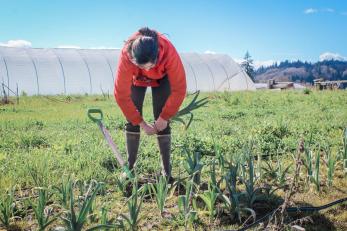
A quick 45-minute drive east of Portland takes you to Headwaters Farm – a 60-acre farming incubator in Gresham that is the home to the 1.6 acres of Good Rain Farm. The small business – led by Michelle Week – is on a mission to bring Native foods back into the food mainstream. By tracing foods back to their origin, she is connecting her farm’s supporters to First Foods native to the Pacific Northwest.
When Michelle was first exploring careers for her future, she gravitated toward interests in gardening and livestock care. Despite these interests, she was encouraged to pursue high-earning jobs like becoming a biologist, veterinarian, or botanist.
Michelle saw a larger picture behind the noise.
“All those career paths can’t exist without food. Farming is a way we make all those other career paths accessible,” she shares.
Michelle took this understanding, followed her passion, and began farming as a hobby.
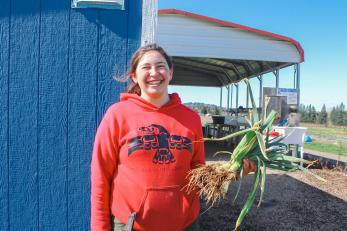
Good Rain Farm began its journey in 2017 when Michelle and a friend established a large garden in Camas. At the time, her farming venture was a passion project and not intended as an undertaking that would grow into a business. But as her project entered the end of its season – a prosperous harvest left so much extra food that a local restaurant reached out to buy veggies.
Over the course of that same month, Michelle sold $700 in produce from her garden. It was then that Michelle finally understood that farming offered space for her to grow her career.
Michelle was balancing part-time jobs, long working hours, and the full-time schedule of tending to her crops when she first started. As a piece of this, she began exploring ways to build her entrepreneurial expertise and heard about business education classes offered at Mercy Corps Northwest.
“When I was like ‘oh..I’m doing a business!’ is when I found Mercy Corps. I took the three-part series of business education classes and during that process, I learned about the IDA program and it helped me a lot to save money, get matched with a grant, and invest in growing my business,” shares Michelle.
The Business Foundations and Business Plans Workshop classes offered by Oregon Women's Business Center helped her to get crisp on the fundamentals. In her transition from gardening to farming, she learned to be more organized and focus on the bottom line needed to support her work.
When Michelle reflects on her nontraditional path into farming, she laments at the lack of opportunity provided to guide her into the field. “Society doesn’t often offer a lot of imagery of women and small-scale farming. On top of that, there is very little imagery of Native women farming,” she shares.
Her role is to try and make that more visible.
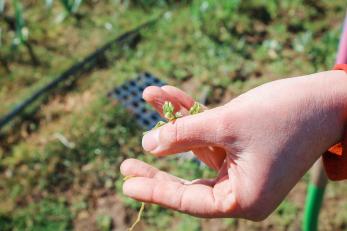
On the farm, Michelle’s early crops are just beginning to sprout. She’s started a row of crops dedicated to the Pacific Northwest with Camas bulbs, Makah Ozette potatoes – known to be the oldest variety of potatoes in the Pacific Northwest – and fragrant Yarrow with smells of licorice. In the row behind the plants, she grows more commonly seen vegetables like leeks, kale, and tomatoes.
Michelle has created this juxtaposition – one might assume – as another way to tell her story. She notes that western food systems often share an incomplete history behind the foods most people consume daily. She explains this by recounting the lineage of tomatoes.
“I think too often we assume foods like tomatoes are European, we have a fairly Eurocentric view of the world, when you think of tomatoes you think of tomato sauce – but tomatoes actually come from South America and traveled to Italy and became more commonly known as that Italian sauce,” she shares.
“I think that’s a tragedy. We’re white-washing the food that we all know and love. And I’m not saying that pizza and pasta are not worth their value – they’re totally worth their value – but also recognizing that those recipes are built off of this other historical relationship in South America and asking: What does that really mean?”
At Good Rain Farm, more accurately x̌ast sq̓it (hast squeit) in the traditional language of the Arrow Lakes Peoples, Michelle focuses on sharing origin stories and produce from Indigenous and First Peoples of North and South America. She uses her farm to pair First Nation crops along with other vegetables and foods that are known, loved – and that people are comfortable eating – to expand their consumption.
To support this model Michelle operates her business as a Community Supported Agriculture or CSA program where local buyers can buy her crops directly. This model she compares to a ‘Kickstarter’, where people pay for seeds before her season begins and are paid back in the crops for the several months after. She is intentional in offering payment options through SNAP and farm-supported food scholarships to keep foods accessible.
“Farming is how we make access to food happen for all people. For me, it’s important to focus on equity in our food system and resiliency in our food system,” she shares.
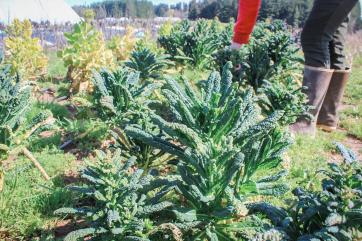
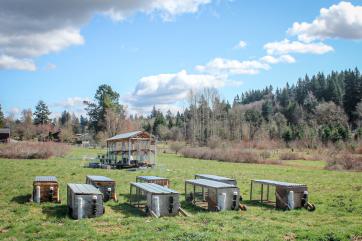
Michelle’s passion for Indigenous diets prevails despite her experience growing up. The connection she has to the many generations of Arrow Lake peoples was something not often spoken about in her family. Her grandma, Michelle recalls, always tried to push away the Native identity that she held.
“I was always told I was Native but told not to tell people. My tribe was considered extinct until about a year ago,” shares Michelle.
Farming has offered her an avenue to challenge this perspective and gain a deeper connection to her ancestors. It’s also brought her closer to the experiences and foods of other Indigenous communities across the globe. “It’s been a pathway for reconnecting with my ancestral diets and foods,” shares Michelle.
One of the large drives behind Good Rain Farm is a goal to help other Arrow Lakes, or sngaytskstx people, know that they are still here and thriving. It’s also to connect to the larger Native experience – to encourage and help those from tribes across the world to explore and grow foods from their culture.
“I’m just really excited that everyone supports me so that I can support these Native crops. Like this Camas plant…We’re going to grow it back so that maybe one day we will see Camas in Fred Meyer and people can have access to it again.”
Michelle continues to dream of the future – with a hope to one day offer fair-wage internships to other Native people in the community to continue to expand and reclaim the knowledge and foods of First Nations. Until then, she is focused on making it through her fifth year in business.
“I think we’re going to make it,” she shares.
Learn more about Michelle, available CSA shares, and x̌ast sq̓it (Good Rain Farm) at www.goodrainfarm.com